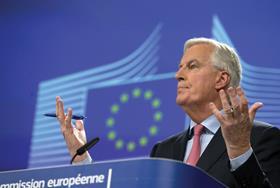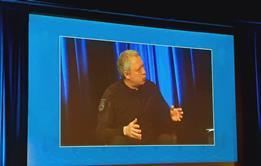Brexit remains a live rebuke to the ethos of multilateralism that has animated the International Bar Association since the global bar’s formation amid the rubble of WW2. Perhaps that is why the UK’s exit from the European Union in 2020 dominated last night’s opening ceremony of the IBA’s annual conference in Paris.
In a speech recorded before recent events in Israel and Gaza, French president Emmanuel Macron duly paid tribute to this spirit of comity and adherence to the rule of law internationally. But he did not pass up the opportunity to flaunt the French’s capital’s credentials as Europe’s leading financial services centre post-Brexit. Paris is well on its way to supplanting the City of London, he insisted - without actually naming London - having grabbed a leading share of the corporate and investment banking market. He also pointed to the pivotal significance of the Paris-based European Securities and Markets Authority.
The French government’s ambitions in this regard are well documented. Wall Street’s biggest banks picked Paris as their main EU trading hub, enticed by business-friendly overtures and tax breaks, when Macron was elected in 2017. And they are expanding quickly, adding hundreds of jobs in recent months. Paris has added just over 5,500 finance positions as a result of Brexit, according to an estimate from lobby group Choose Paris Region.
Macron added: 'We are children of Roman law, which is sometimes said to be less conducive to export than Anglo-Saxon common law. This French and European law is the one that wrote, yesterday, the global framework for environmental protection; that writes today the rules of our digital globalisation, through the major European regulatory texts, as recent events show us.'

Delivering the keynote address last night, Michel Barnier, the EU’s chief Brexit negotiator, spoke more in sorrow than in anger. The French former foreign minister described Brexit as a ‘painful and costly divorce’ and a ‘lose-lose game’ for both parties. It was a ‘failure of the EU’ as well as the UK.
‘No one in six years has ever been able to give me any proof of the added value of Brexit,’ he said. ‘We now see that question raised in domestic (UK) debate on this topic, which remains active.’
Barnier came brandishing a copy of his Secret Brexit Diary, which purports to explain how the UK came to be so comprehensively outnegotiated. ‘Four years ago Nigel Farage asked me for a meeting in my office,’ Barnier continued. ‘The meeting was, as was usual with him, extremely stimulating. I asked him about the relationship between the UK and EU after Brexit, and he replied: “Mister Barnier, after Brexit the EU will no longer exist”. This was not the only fake promise with him, which was one his specialities.’
Barnier suggested Brexit was driven by ‘ideology and rhetoric’, despite being plainly inimical to British interests.
‘Mr Farage, and other of his friends, still want Europe to explode, with the support of Russian and even American networks,’ Barnier added, to a round of applause.
Commenting on events in the Middle-East, Barnier said it must be a ‘priority’ of the EU to work with the US and others countries to bring a lasting peace. He admitted, however, that a two-state solution to the Israeli–Palestinian conflict currently appears ‘utopian’.
‘This confict is at the root of so many tensions in the region, and of course in our own societies since 1967 and even earlier,’ he said. ‘Let me be very frank and very clear on this conflict. Number one, the security and sovereignty of the state of Israel is not negotiable. We stand on the side of freedom against barbarism and terrorism.
'Number two, peace in the Middle East under the control of the United Nations will only be acheived with the establishment of a Palestinian state.' He added: 'In our societies, London, Paris, and everywhere, we must also fight any form of anti-semitism.'
This article is now closed for comment.
Topics
IBA 2023: Ukraine seeking watertight 'evidentiary base' for genocide charge

‘They want to dehumanise us’: conference also hears emotionally charged exchange between Ukraine’s chief prosecutor and the head of Israel’s bar on dealing with alleged perpetrators of atrocities.
- 1
- 2
- 3
- 4
- 5
- 6
 Currently
reading
Currently
reading
Chief EU negotiator laments 'lose-lose' for EU and UK, while French president says Paris is on course to overtake City of London










































28 Readers' comments